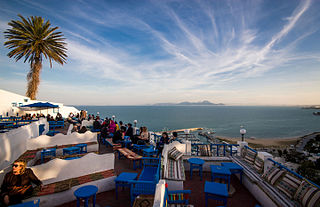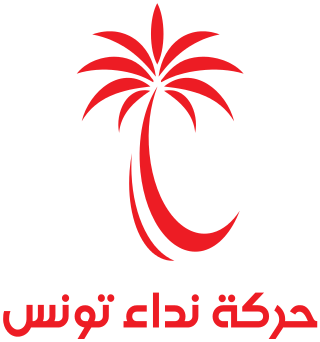
Sidi Bou Said is a town in northern Tunisia located about 20 km northeast from the capital, Tunis.

Fouad Mebazaa is a Tunisian politician who was the acting president of Tunisia from 15 January 2011 to 13 December 2011. He was active in Neo Destour prior to Tunisian independence, served as Minister of Youth and Sports, Minister of Public Health, and Minister of Culture and Information, and was Speaker of the Chamber of Deputies of Tunisia from 1991 to 2011.

Presidential elections were held in Tunisia on 23 November 2014, a month after parliamentary elections. They were the first free and fair presidential elections since the country gained independence in 1956, and the first direct presidential elections after the Tunisian Revolution of 2011 and the adoption of a new Constitution in January 2014.

Carthage Palace is the presidential palace of Tunisia, and the official residence and seat of the President of Tunisia. It is located along the Mediterranean Sea at the current city of Carthage, near the archaeological site of the ancient city, fifteen kilometers from Tunis. A house by Le Corbusier sits within the site.

Beji Caid Essebsi was a Tunisian politician who served as the sixth president of Tunisia from 31 December 2014 until his death on 25 July 2019. Previously, he served as the minister of foreign affairs from 1981 to 1986 and as the prime minister from February 2011 to December 2011.

Habib Essid is a Tunisian politician who was Head of Government of Tunisia from 6 February 2015 to 27 August 2016. He was the first Head of Government to be appointed following the adoption of the new constitution and thus considered to be the first Head of Government of the Second Tunisian Republic. He previously served as Minister of the Interior in 2011.

Nidaa Tounes is a big tent secularist political party in Tunisia. After being founded in 2012, the party won a plurality of seats in the October 2014 parliamentary election. The party's founding leader Beji Caid Essebsi was elected President of Tunisia in the 2014 presidential election.

Parliamentary elections were held in Tunisia on 26 October 2014. Campaigning started on 4 October 2014. They were the first free regular legislative elections since independence in 1956, and the first elections held following the adoption of the new constitution in January 2014, which created a 217-seat Assembly of the Representatives of the People. According to preliminary results, Nidaa Tounes gained a plurality of votes, winning 85 seats in the 217-seat parliament, beating the Ennahda Movement and many smaller parties.
On 16 July 2014, militants from the Uqba Ibn Nafi Battalion attacked two checkpoints in the Chaambi Mountains killing fourteen Tunisian soldiers and injuring twenty-five. The 2014 Chaambi Mountains attack is the deadliest militant skirmish involving the Tunisian Armed Forces since their independence in 1956.

Sweden–Tunisia relations refers to the current and historical relationship between Sweden and Tunisia. Connections between the two countries date back to 1736, when the Swedes concluded a treaty of peace and trade with the Beylik of Tunis. Formal relations began after Tunisian independence from France in 1956, and have continued since. Sweden formerly had an embassy in Tunis, now closed. Instead, the Swedish ambassador resides in Stockholm, where Tunisia also maintains an embassy.

On 18 March 2015, two militants attacked the Bardo National Museum in the Tunisian capital city of Tunis, and took hostages. Twenty-one people, mostly European tourists, were killed at the scene, and an additional victim died ten days later. Around fifty others were injured. The two gunmen, Tunisian citizens Yassine Labidi and Saber Khachnaoui, were killed by police. Police treated the event as a terrorist attack.
The following lists events that happened during 2015 in the Tunisian Republic.

On 26 June 2015, a mass shooting occurred at the tourist resort at Port El Kantaoui, about 10 kilometres north of the city of Sousse, Tunisia. Thirty-eight people, 30 of whom were British, were killed when a gunman, Seifeddine Rezgui, attacked a hotel. It was the deadliest non-state attack in the history of modern Tunisia, with more fatalities than the 22 killed in the Bardo National Museum attack three months before. The attack received widespread condemnation around the world. The Tunisian government later "acknowledged fault" for slow police response to the attack.
On 24 November 2015, a bus carrying Tunisian presidential guards exploded, killing 12, on a principal road in Tunis, Tunisia. ISIL claimed responsibility for the attack. The bomber, who also died in the attack, was identified as Houssem Abdelli.

Mohamed Ennaceur is a Tunisian politician who served as the acting president of Tunisia for 91 days, from President Beji Caid Essebsi's death on 25 July 2019 until he handed over the presidency to Kais Saied as the winner of the 2019 Tunisian presidential election on 23 October 2019. Since 2014, he has also been the President of the Assembly of the Representatives of the People and leader of the governing Nidaa Tounes party. Previously, he served as Minister of Social Affairs in the 1970s and 1980s under President Habib Bourguiba and again in 2011 in the transitional Ghannouchi and Essebsi governments.

The Islamic State Insurgency in Tunisia referred to the low–level militant and terror activity of the Islamic State branch in Tunisia from 2015 to 2022. The activity of the Islamic State (IS) in Tunisia began in June 2015, with the Sousse attacks, though an earlier terror incident in Bardo Museum in March 2015 was claimed by ISIL, while the Tunisian government blamed Okba Ibn Nafaa Brigade for the attack. Following massive border clashes near Ben Guerdane in March 2016, the activity of the IS group was described as an armed insurgency, switching from previous tactics of sporadic suicide attacks to attempts to gain territorial control. The armed insurgency was suppressed in 2022.

Latifa Lakhdar is a Tunisian historian and politician who was Minister of Culture from February 2015 until January 2016.
Events in the year 2019 in Tunisia.

Chadlia Saïda Farhat Essebsi was the First Lady of Tunisia (2014–2019) as the wife of President Beji Caid Essebsi. She was Tunisia's fifth first lady, as well as the second following the Tunisian Revolution.

Nabil Karoui is a Tunisian politician and businessman. One of the key figures in the Tunisian media landscape, Karoui is CEO of Karoui & Karoui World and owner of the Tunisian television station Nessma. Karoui ran as a candidate in the 2019 Tunisian presidential election, finishing in second place.















